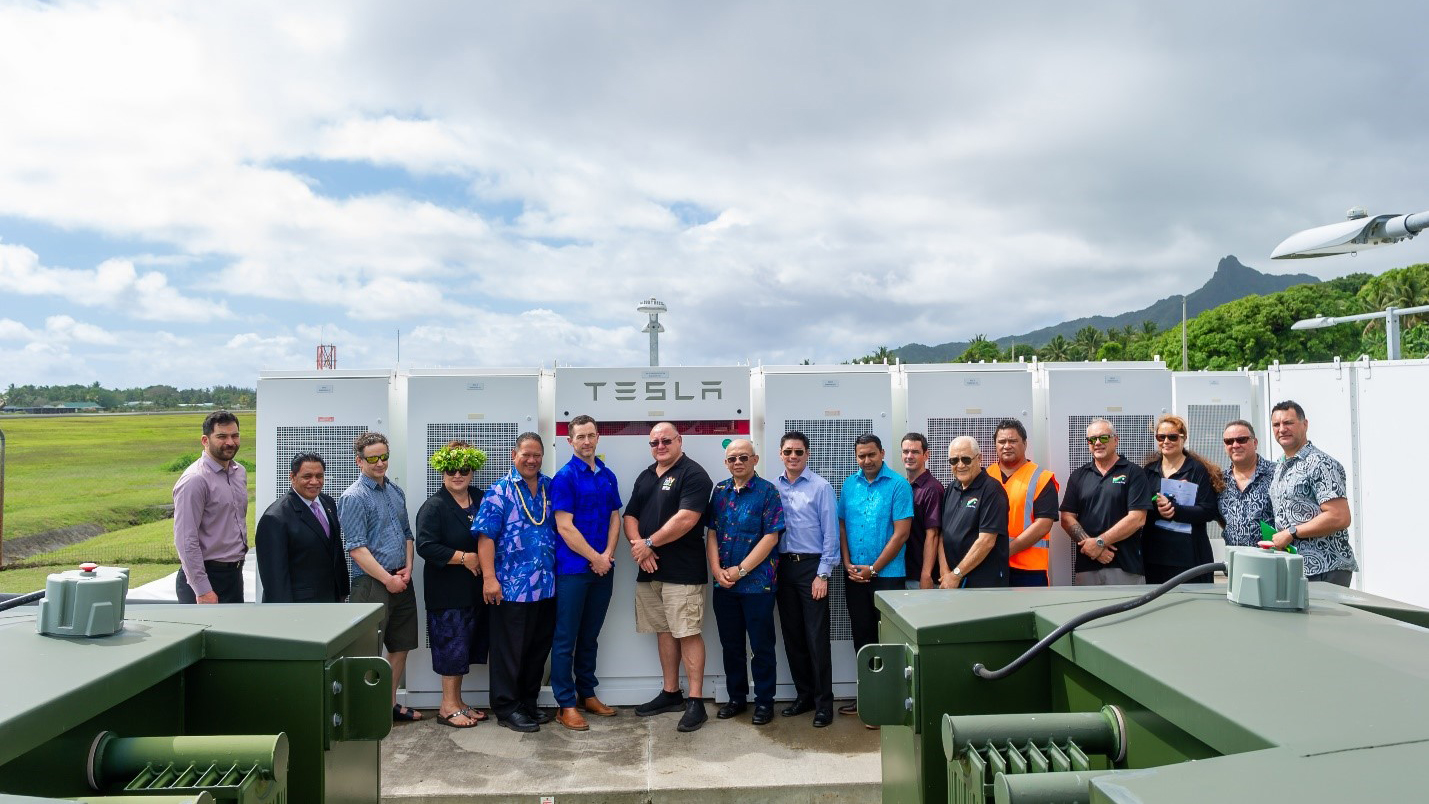US$16m batteries store Sun’s energy, reduce oil need
Friday 2 September 2022 | Written by Melina Etches | Published in Environment, National

Te Aponga Uira (TAU) power station’s official opening of its new battery energy storage system (BESS). 22090101
Three newly commissioned battery systems on Rarotonga which cost US$16 million (approx. NZ$24m) will reduce the island’s dependence on oil-fuelled power generation and continue the shift to solar power.
The three Battery Energy Storage Systems (BESS) are located at Te Aponga Uira (TAU) Power Station up the Avatiu Valley, Rarotonga Airport West, and Airport South.
The commissioning of these assets is part of the Cook Islands Renewable Energy Project to reach its goal of delivering renewable energy to all its islands and reducing the nation’s dependency on fossil fuels by constructing solar-powered plants.
Designed to enable a reduction in the number of diesel generators operating, TAU’s BESS system will also provide grid stability functions such as frequency support and voltage support in the event of rapid changes in solar PV output or faults in the network for the island’s power station.
Te Aponga Uira’s 6MW/3MW system uses Rolls Royce Solutions MTU Energy Packs (Samsung batteries and Danfoss inverters), and the system will support the operation of the grid so it remains robust even with additional high levels of renewable energy.
Installed by New Zealand-based company Vector Powersmart Ltd, the battery system was completed last month and the system was opened by the chairman of the TAU Board, Mata Nooroa, and Asian Development Bank (ADB) executive director, Arif Baharudin.
The Airport West BESS system is located on the northern side of the airport; the purpose of its design is to alleviate constraint on new solar PV installations to the grid.
This BESS system sits adjacent to the existing 1MW PV plant to store all the PV plant output during the day for release in the evening, which will relieve pressure on the stability of the grid permitting completion of additional solar PV installations.
The capacity 1MW/4MWh system was installed by Australian company Mpower using LG Chem batteries and Ingeteam inverters.
Funded by the Global Environment Fund (GEF), this component was completed in 2019 and formally opened by the Government’s financial secretary Garth Henderson, and Baharudin.
The Airport South BESS system has a capacity of 2MW/8MWh for load shifting which enables more daytime renewable generation to be stored for use in the evening.
It includes an integrated modular system, usable storage capacity of 8 MWh, has the capability to charge and discharge at 2 MW, 11 kV connection to the grid with full interface to the TAU SCADA system.
Completed in 2020, the system includes a Tesla Power Pack technology and controller, enabling it to respond almost instantaneously to commands from TAU, to store or release power to meet the demands of the network installed by Vector Powersmart Ltd.
Numangatini Ariki Tangi Tereapii from the Renewable Energy Development Division (REDD) of the Office of the Prime Minister (OPM) and Baharudin opened the Airport South system.
The Cook Islands Renewable Energy Project BESS System was conceived in 2015 along with the delivery of the Phase 1 - Solar PV Power stations on the islands of Atiu, Mangaia, Mauke and Mitiaro in 2018.
Expected to be in service for at least 10 - 15 years, this project includes the operations and maintenance of the system which will involve Vector Powersmart Limited, Tesla, Entura and TAU engineers working collaboratively and with comprehensive training in operation and maintenance of the system.
The project is delivered by the Project Management Unit (PMU) and Project Owners Engineers (Entura) under the REDD of the OPM working closely with Te Aponga Uira and MFEM), in line with the implementation plan.
The financing of the Airport South BESS system and the Power Station BESS system, was supported by the Green Climate Fund (GCF) and administered by the Asian Development Bank (ADB), through grant funding.















































